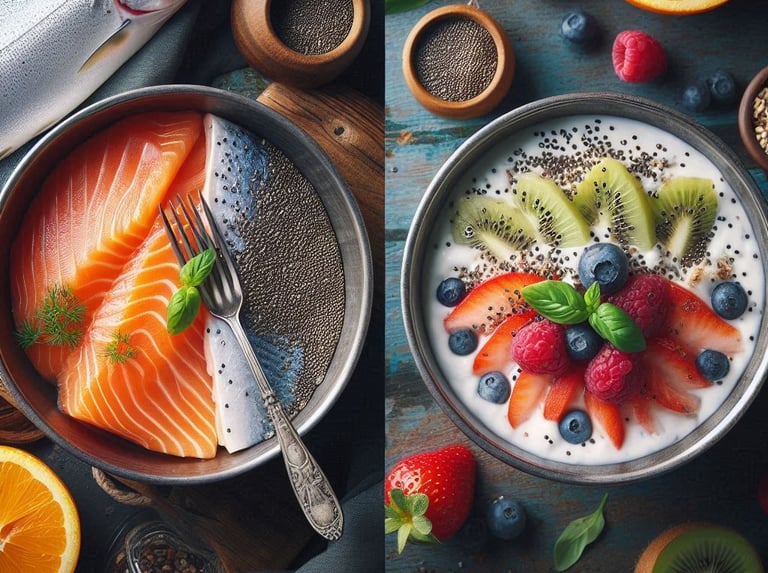
Functional Foods: What They Are and How to Incorporate Them into Your Diet
Explores the growing trend of functional foods, which offer extra health benefits beyond basic nutrition. The article highlights how these foods can help prevent diseases, boost immunity, and improve overall well-being. It provides practical tips on incorporating functional foods like omega-3-rich fish, probiotics, and antioxidant-rich fruits into daily meals. With easy suggestions for breakfast, snacks, and main meals, readers can learn how to naturally enhance their diet for better health and vitality.
Functional Foods: What They Are and How to Incorporate Them into Your Diet
In recent years, the concept of functional foods has gained prominence in the world of nutrition and health. These foods not only provide essential nutrients for our bodies but also offer additional health benefits, potentially preventing diseases and promoting overall well-being. Incorporating functional foods into your diet can be an excellent way to improve health naturally and sustainably. In this article, we will explore what functional foods are, their benefits, and how you can easily include them in your daily meals.
What Are Functional Foods?
Functional foods are those that, in addition to their basic nutritional properties, provide extra health benefits. These foods can help prevent chronic diseases, boost the immune system, reduce inflammation, and offer other positive effects.
They may occur naturally or be fortified with beneficial components like vitamins, minerals, fiber, probiotics, or antioxidants. Some examples include omega-3-rich foods such as fish and chia seeds, cruciferous vegetables like broccoli, and fermented foods like kefir.
Benefits of Functional Foods
Regular consumption of functional foods can provide a range of health benefits. Some of the key advantages include:
- Disease Prevention: Many functional foods have anti-inflammatory, antioxidant, or other properties that help reduce the risk of chronic diseases like diabetes, heart disease, and cancer.
- Improved Digestion: Foods rich in fiber, such as oats and flaxseeds, help promote gut health and regulate the digestive system, preventing issues like constipation.
- Immune System Boost: Foods rich in vitamins and antioxidants, such as berries and citrus fruits, help the body fight infections and strengthen the immune system.
- Cholesterol and Blood Pressure Regulation: Omega-3-rich foods like fatty fish (salmon, sardines) help maintain healthy cholesterol levels and regulate blood pressure.
- Mental and Cognitive Health: Certain functional foods, such as nuts, seeds, and omega-3-rich fish, contribute to brain health, improving memory and reducing the risk of neurodegenerative diseases.
How to Incorporate Functional Foods into Your Diet
Incorporating functional foods into your diet doesn’t have to be difficult. Here are some practical tips to start introducing these superfoods into your daily meals:
1. Start the Day with a Functional Breakfast
Take advantage of the first meal of the day to include foods that benefit your health. Try a bowl of oatmeal (rich in fiber and protein) with berries (antioxidants), chia seeds (omega-3 and fiber), and a drizzle of honey or natural yogurt, which is an excellent source of probiotics.
2. Add Smoothies and Juices
Smoothies and juices are a great way to include multiple functional foods at once. Combine ingredients like kale (rich in vitamins and minerals), pineapple (rich in bromelain, which aids digestion), ginger (a natural anti-inflammatory), and flaxseeds (fiber and omega-3) for a functional and delicious detox juice.
3. Include Whole Grains and Legumes in Main Meals
Whole grains like quinoa and brown rice, and legumes like beans and lentils, are rich in fiber and nutrients that promote satiety and improve digestion. Try replacing refined grains in your lunch or dinner with these options for more nutritional benefits.
4. Invest in Omega-3 Rich Foods
Fatty fish such as salmon, sardines, and tuna are natural sources of omega-3, which have anti-inflammatory properties and are great for heart and brain health. If you don't consume fish regularly, consider adding chia seeds, flaxseeds, or walnuts to your meals or snacks.
5. Opt for Fermented Foods
Fermented foods like kefir, yogurt, sauerkraut, and kimchi are rich in probiotics, which help maintain the balance of gut bacteria and promote digestive and immune health. These foods can be easily incorporated as side dishes or snacks.
6. Use Functional Herbs and Spices
Herbs and spices like turmeric, ginger, oregano, and cinnamon have anti-inflammatory and antioxidant properties. In addition to adding more flavor to your dishes, they are powerful allies in disease prevention and promoting better health.
7. Choose Functional Snacks
Swap ultra-processed snacks for healthier options like nuts (rich in healthy fats and antioxidants), fruits (vitamins and fiber), or probiotic-rich yogurts. These foods are convenient and contribute significantly to a balanced diet.
Famous Functional Foods and Their Benefits
Here is a list of some of the most well-known functional foods and their main benefits:
- Berries (like strawberries and blueberries): Rich in antioxidants, they help fight cellular aging.
- Oats: High in soluble fiber, they contribute to cardiovascular health and cholesterol regulation.
- Salmon: A source of omega-3, it helps reduce inflammation and promote heart health.
- Flaxseeds and Chia Seeds: Rich in fiber and omega-3, they improve digestion and help control cholesterol.
- Yogurt and Kefir: Rich in probiotics, they strengthen the immune system and promote gut health.
- Green Tea: Rich in catechins, antioxidants that aid in weight loss and protect cells.
- Turmeric: Has anti-inflammatory and antioxidant properties, contributing to overall health.
Conclusion: Functional Foods and a Healthy Life
Incorporating functional foods into your diet is an effective and natural way to improve long-term health. In addition to being delicious and nutritious, these foods provide additional benefits that can help prevent diseases and promote a more balanced and healthy life.
By making small changes and incorporating some of these functional foods into your daily routine, you will be taking a significant step towards a healthier life full of vitality. Remember, consistency is key: by adopting these eating habits, you’re not only nourishing your body but also preventing diseases and promoting long-lasting well-being.




